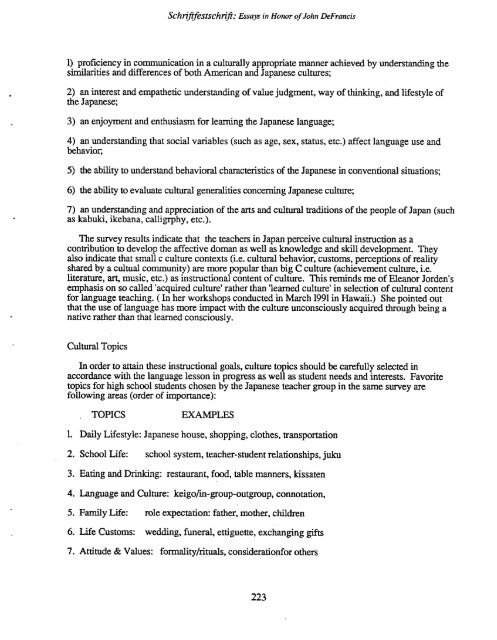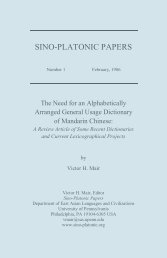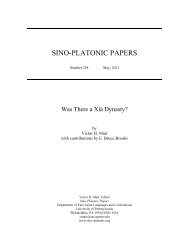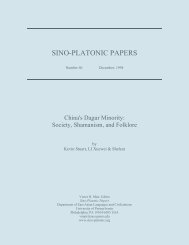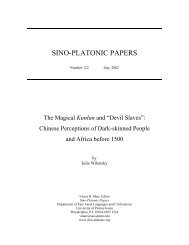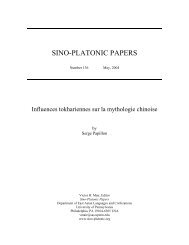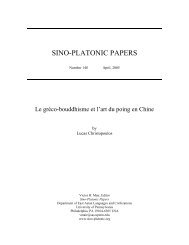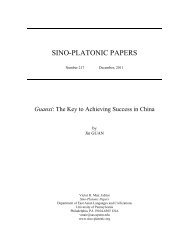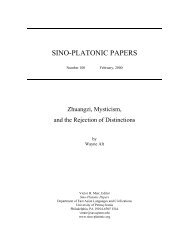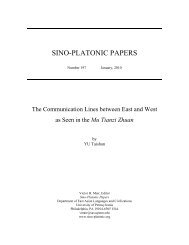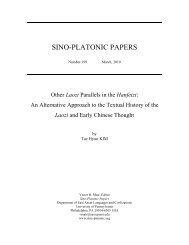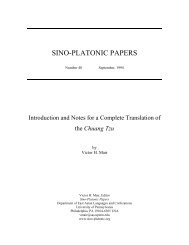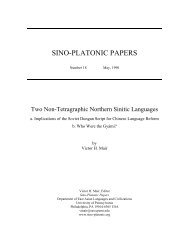Essays on Writing and Language in Honor - Sino-Platonic Papers
Essays on Writing and Language in Honor - Sino-Platonic Papers
Essays on Writing and Language in Honor - Sino-Platonic Papers
You also want an ePaper? Increase the reach of your titles
YUMPU automatically turns print PDFs into web optimized ePapers that Google loves.
Schnfifestschrift: <str<strong>on</strong>g>Essays</str<strong>on</strong>g> <strong>in</strong> H<strong>on</strong>or of John DeFrancis<br />
1) proficiency <strong>in</strong> communicati<strong>on</strong> <strong>in</strong> a culrurally appropriate manner achieved by underst<strong>and</strong><strong>in</strong>g the<br />
similarities <strong>and</strong> differences of both American <strong>and</strong> Japanese cultures;<br />
2) an <strong>in</strong>terest <strong>and</strong> empathetic underst<strong>and</strong><strong>in</strong>g of value judgment, way of th<strong>in</strong>k<strong>in</strong>g, <strong>and</strong> lifestyle of<br />
the Japanese;<br />
3) an enjoyment <strong>and</strong> enthusiasm for learn<strong>in</strong>g the Japanese language;<br />
4) an underst<strong>and</strong><strong>in</strong>g that social variables (such as age, sex, status, etc.) affect language use <strong>and</strong><br />
behavior,<br />
5) the ability to underst<strong>and</strong> behavioral characteristics of the Japanese <strong>in</strong> c<strong>on</strong>venti<strong>on</strong>al situati<strong>on</strong>s;<br />
6) the ability to evaluate cultural generalities c<strong>on</strong>cern<strong>in</strong>g Japanese culture;<br />
7) an underst<strong>and</strong><strong>in</strong>g <strong>and</strong> appreciati<strong>on</strong> of the arts <strong>and</strong> cultural traditi<strong>on</strong>s of the people of Japan (such<br />
as kabuki, ikebana, calligrphy, etc.).<br />
The survey results <strong>in</strong>dicate that the teachers <strong>in</strong> Japan perceive cultural <strong>in</strong>structi<strong>on</strong> as a<br />
c<strong>on</strong>tributi<strong>on</strong> to develop the affective doman as well as knowledge <strong>and</strong> skill development. They<br />
also <strong>in</strong>dicate that small c culture c<strong>on</strong>texts (i.e. cultural behavior, customs, percepti<strong>on</strong>s of reality<br />
shared by a cultual community) are more popular than big C culture (achievement culture, i.e.<br />
literature, art, music, etc.) as <strong>in</strong>structi<strong>on</strong>al c<strong>on</strong>tent of culture. This rem<strong>in</strong>ds me of Eleanor Jorden's<br />
emphasis <strong>on</strong> so called 'acquired culture' rather than learned culture' <strong>in</strong> selecti<strong>on</strong> of cultural c<strong>on</strong>tent<br />
for language teach<strong>in</strong>g. ( In her workshops c<strong>on</strong>ducted <strong>in</strong> March 1991 <strong>in</strong> Hawaii.) She po<strong>in</strong>ted out<br />
that the use of language has more impact with the culture unc<strong>on</strong>sciously acquired through be<strong>in</strong>g a<br />
native rather than that learned c<strong>on</strong>sciously.<br />
Cultural Topics<br />
In order to atta<strong>in</strong> these <strong>in</strong>structi<strong>on</strong>al goals, culture topics should be carefully selected <strong>in</strong><br />
accordance with the language less<strong>on</strong> <strong>in</strong> progress as well as student needs <strong>and</strong> <strong>in</strong>terests. Favorite<br />
topics for high school students chosen by the Japanese teacher group <strong>in</strong> the same survey are<br />
follow<strong>in</strong>g areas (order of importance):<br />
TOPICS EXAMPLES<br />
1. Daily Lifestyle: Japanese house, shopp<strong>in</strong>g, clothes, transportati<strong>on</strong><br />
2. School Life: school system, teacher-student relati<strong>on</strong>ships, juku<br />
3. Eat<strong>in</strong>g <strong>and</strong> Dr<strong>in</strong>k<strong>in</strong>g: restaurant, food, table manners, kissaten<br />
4. <strong>Language</strong> <strong>and</strong> Culture: keigo/<strong>in</strong>-group-outgroup, c<strong>on</strong>notati<strong>on</strong>,<br />
5. Family Life: role expectati<strong>on</strong>: father, mother, children<br />
6. Life Customs: wedd<strong>in</strong>g, funeral, ettiguette, exchang<strong>in</strong>g gfts<br />
7. Attitude & Values: fomality/rituals, c<strong>on</strong>siderati<strong>on</strong>for others


